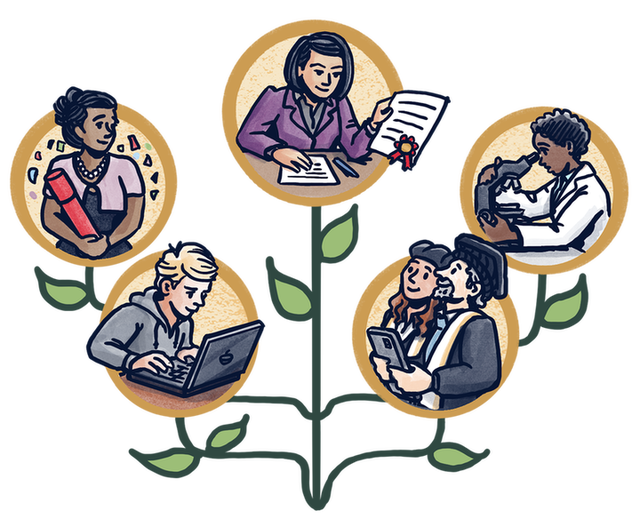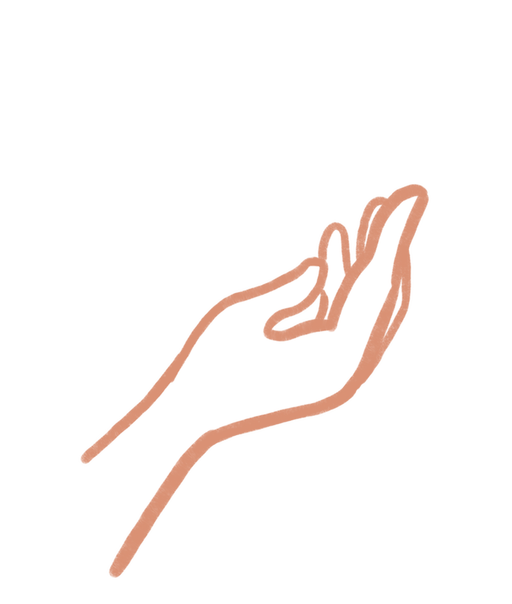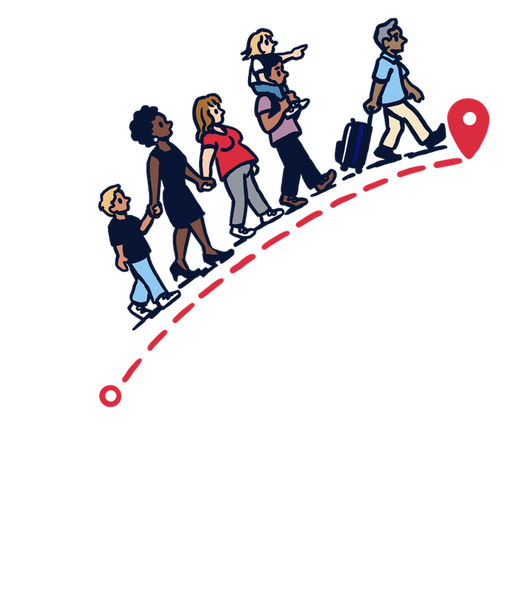6
What’s in it for us?
Diversity and family support
6.1
Coming to the Netherlands
One important financial benefit of moving to the Netherlands as an academic is the ‘30% rule’ (30%-regeling), a special tax exemption on thirty percent of one’s salary.
Foreign researchers must apply for this (limited term) tax exemption together with the institution at which they are employed. More information can be found on this webpage of the Dutch Tax and Customs Administration (Belastingdienst). The Belastingdienst also provides a checklist of other things to know when moving to the Netherlands.
Most Dutch universities do not have a ‘double career’ policy. Partners and spouses cannot expect to receive more help than a general introduction to the job market.
6.2
International staff in Dutch academia
The proportion of foreign academics in the Netherlands is growing. According to data from UNL, in 2020, 43.7% of academic staff came from abroad. For more details see, e.g., by area of origin in this report of the Rathenau Institute.
English is increasingly used in higher education and research in the Netherlands, varying across universities and disciplines. You may well get along without speaking Dutch, though several tasks require speaking Dutch, e.g. to participate actively in policymaking and decision-making.
While it seems fair to say that most foreign academics in the Netherlands are satisfied with their working conditions, there are a few recurring issues that they highlight: the fact that, despite appearances, Dutch universities can be quite hierarchical; that, despite assurances to the contrary, learning the language can prove essential to advancing one’s career; and that the Dutch cultivate a frankness in their professional relationships to which foreigners can find it difficult to adapt.
6.3
Diversity and inclusion
Diversity and inclusion mean first and foremost the fair distribution of opportunities for everyone in the field of science and scholarship. Many scientific studies show, however, that gender, race, ethnicity, class, and sexuality result in unequal opportunities for researchers.
A National Action Plan on Diversity was launched by the Ministry of Education, Culture and Science in 2020. This and other initiatives are intended to eventually lead to greater diversity and inclusion at universities. Often, universities manage to attract underrepresented groups, but then fail to retain them. To do so means ensuring an inclusive climate and structure for all employees.
Most universities have a (chief) Diversity Officer, academics or professionals who work in the field of diversity and inclusion, some even more than one. The duties of a diversity officer include raising awareness of diversity and inclusion, creating and developing diversity policy, encouraging cultural change, identifying and stimulating initiatives that promote diversity and inclusion, monitoring and reporting, as well as setting up and maintaining a network. Read more, e.g., on the website of UNL.
6.4
Women in Dutch academia
Women remain underrepresented at all higher levels of Dutch academia, despite a general awareness of this issue. The reasons for this underrepresentation are complex. Not only are there a limited number of female role models but discrimination and gender stereotyping also play a part (for facts and analysis, see, e.g., Athena’s Angels website. Young parents usually work four days per week in the Netherlands, and some researchers feel that part-time work is not compatible with a successful academic career – in any case, it is certainly an additional strain.
Potential role models are being showcased by dedicated awards for outstanding women: the Athena award for chemists, the Minerva award for physicists, the Professor de Winter award at the University of Twente, and others. An affirmative action programme was initiated by the KNAW in 2017. In both 2017 and 2018, it organised women-only elections to install sixteen new female members of the Academy, in addition to the regular rounds that are held annually. In 2017, the Minister of OCW, Jet Bussemaker, obligated Dutch universities to create an additional one hundred chairs for female professors, called the ‘Westerdijk chairs’ in honour of the first female professor in the Netherlands, the Dutch biologist Johanna Westerdijk (1883-1961).
Other affirmative action initiatives include the nationwide implementation of tenure track positions dedicated to outstanding female academics. The tenure-track positions that are offered under these initiatives are usually very competitive, but also very attractive – they are prestigious and offer extra benefits. The Rosalind Franklin Fellowships were created first (UG), soon followed by the McGillavry Fellowship (UvA), the Fenna Diemer-Lindeboom Fellowship (VU), and the U-Twist Fellowship (UT).
Remaining challenges include what is often referred to as a dysfunctional ‘pipeline’ of women, starting with young female students at the start of their studies all the way up to the top of the academic ranks. This loss of talent has resulted in the underrepresentation of women at the professorial level (25.7% female professors in the Netherlands in 2021). The Dutch Network of Women Professors (Landelijk Netwerk Vrouwelijke Hoogleraren, LNVH) monitors progress on an annual basis and updated information can be found on its website. Although the number has improved, the Netherlands rank 21 of the 28 EU Member States.
6.5
Parental leave and childcare
All Dutch funding procedures take parental leave into account in their eligibility criteria. Women are usually allowed an 18-month extension on their eligibility for major grants for each child, up to a maximum of three children. NWO also allows the other parent a six-month extension per child (if the child is part of their own household, at least 50% of the time), with a maximum of five years. This applies for the major NWO grants. However, at the time of writing, there is no national consensus on how parental leave should be factored into tenure-track procedures. NWO applicants can also receive an extension if they have completed training as a clinical specialist or can provide evidence that proves they were on care leave or extended sick leave.
Generally speaking, there are two childcare options for kids from 0-4 years: a day care centre (kinderdagverblijf) or a child minder (gastouder) (note that Dutch employees often rely on grandparents to fill in the remaining hours, a luxury not usually available to international staff). To the best of our knowledge, there is currently no dedicated funding in support of childcare at Dutch universities. It is not unusual, and not frowned upon, for young researchers to work for four days per week temporarily. Parents in the Netherlands can apply for a childcare benefit covering childcare expenses.
Once children are in school, parents have the option of paying for ‘afterschool care’ (buitenschoolse opvang, bso), often organised on the school premises or nearby and consisting of supervised play. This makes it possible to drop children off at school at the beginning of the work day, and to pick them up from bso at the end.
Depending on where you are living, finding a spot in a day care or school for your children can be challenging. Particularly in busy urban areas like Amsterdam, schools are quite full and a ‘lottery’ system is sometimes used to allocate spots.
6.6
Social safety
To combat undesirable behaviour at scientific institutions, it is necessary to do a lot in terms of prevention, besides handling complaints and making behaviour in the workplace a structural topic of discussion. At the request of the Minister of Education, Culture and Science, the KNAW has published the guide Social safety in Dutch academia - From paper to practice with guidelines and tips to prevent problems with undesired behavior or to adjust them at an early stage.
Het gebruik van woorden
Uit onderzoek blijkt dat het gebruik van woorden die over het algemeen als vrouwelijk worden beschouwd andere genders vaak niet afschrikken, terwijl woorden die over het algemeen als mannelijk worden beschouwd vrouwen ervan kunnen weerhouden te solliciteren.
Woorden die over het algemeen als vrouwelijk worden beschouwd
Aardig, bedachtzaam/zorgzaam, begripvol, behulpzaam, beleefd, bereidwillig, bescheiden, betrokken, betrouwbaar, flexibel/meegaand, groepsgericht, communicatief, coöperatief, creatief, eerlijk, emotioneel, empathie/empathisch, enthousiast, vrouwelijk, gevoelig, gezellig, aanhankelijk, humaan, onderling afhankelijk, interpersoonlijk, klantvriendelijk, loyaal, medelevend, menselijk, nauwgezet/precies, onderdanig, open, ordelijk, plezierig, sociaal, ondersteuning/ondersteunend, stil/op zichzelf, sympathiek, toegewijd, veelzijdig, verantwoordelijk, verbindend/verbonden, verwantschap, vleiend, dociel, vriendelijk, vrolijk, warm, zachtaardig, voorzichtig
Woorden die over het algemeen als mannelijk worden beschouwd
Actief, agressief, analytisch, assertief, atletisch, autonoom, avontuurlijk, vastbesloten, besluitvaardig, bluffen/opscheppen, chemisch, commercieel, competent, competitief, deskundig, direct, doelgericht, vastberaden, effectief, dominant, energiek, fanatiek, gedreven, gretig/hebzuchtig, overdreven, obstinaat, handig, hiërarchisch, impulsief, individueel, individualistisch, industrieel, ingenieus, innovatief, koppig/star, kracht, kritisch, leider/leiderschap, logisch, mannelijk, mening, moed, moedig, meedogenloos/roekeloos, objectief, zelfstandig, ondernemend, praktijkgericht, principieel, professioneel, resultaatgericht, snel, solide, sterk, stressbestendig, superieur, technisch, leidend, uitdagend, vijandig, volhardend, onafhankelijk, zelfsturend, zelfverzekerd, zelfvoorzienend
Bron: Direction’s research Inclusive Recruitment and Selection (2016), p. 18/19, Vervecken, Verwijvel, Gijbels & Van den Bossche, P. (2015), Pennebaker, Booth & Francis (2007).
Colophon
2022 The Young Academy (De Jonge Akademie)
© Some rights reserved.
Usage and distribution of this work is defined in the Creative Commons License, Attribution 4.0 Netherlands. (CC BY-NC-SA 4.0)
ISBN: 978-90-6984-751-1
The Young Academy
PO Box 19121, NL-1000 GC Amsterdam T+31 (0)20 551 0702
dja@knaw.nl
The Young Academy is an independent part of the Royal Netherlands Academy of Arts and Sciences
Text: Raf de Bont, Tatiana Filatova, Jason Hessels, Nathalie Katsonis, Christian Lange
Illustrations: Rachelle Meyer
Design & realisation: WAT ontwerpers
Platform: H5mag.com
Preferred citation: The Young Academy (2022). A beginner’s guide to Dutch academia, Amsterdam


